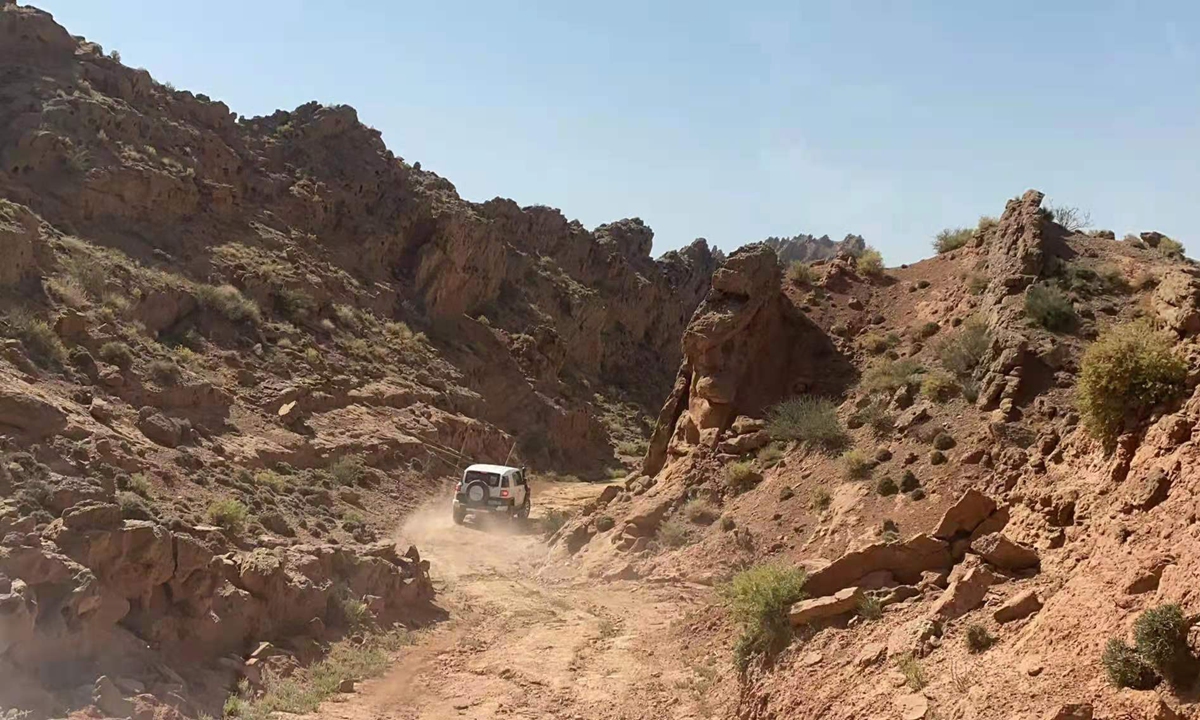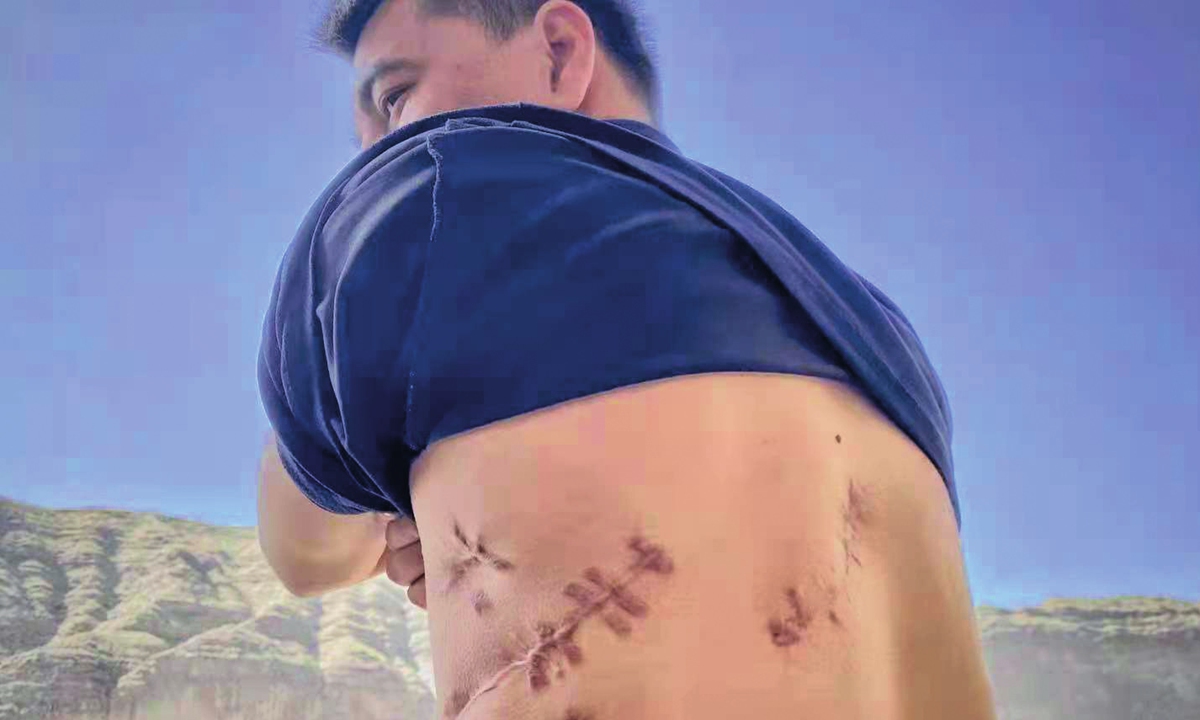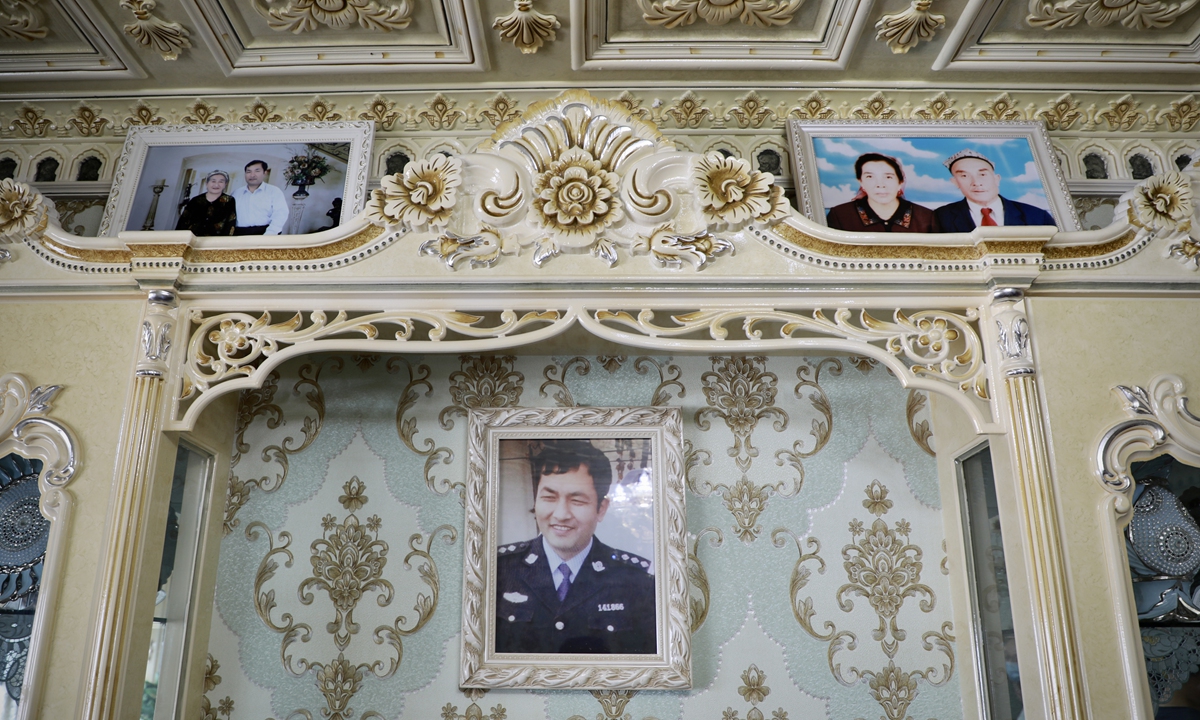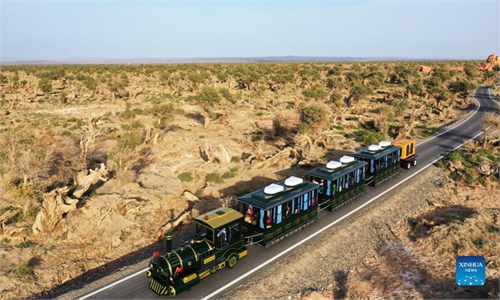GT Exclusive: ‘I’m lucky to be alive.' Xinjiang police officer recalls 56-day manhunt for terrorists in mountains

An off-road vehicle runs on the bump road down the Tianshan Mountains. Photo: He Zhuoqian/GT
The dazzling sunshine in late September shines upon the craggy foothills of the Tianshan Mountains. The unique natural landscape is undoubtedly attractive to hikers, but to Xinjiang police officers who have shed blood on the land they love, the place carries special significance."Even breathing is a fortune for me now," said Dilxat Mutallip, a Xinjiang police officer who was almost shot to death by a terrorist during a manhunt mission.
Dilxat still remembers every detail of the hard-won battles against the brutal terrorists in 2015. Eventually, a total of 28 terrorists were killed and one surrendered. During the attack and manhunt, 11 civilians and five police officers were killed, and 18 were injured.
Authorities have given official account of the terror attack that year. But apparently, Western media outlets were not satisfied. They were reluctant to acknowledge that those brutal attackers were indeed terrorists - a New York Times article, when reporting on the attack, described them as "armed with 'only' knives."
When reporting on China's counter-terrorism efforts, Western media have played on double standards and tried to undermine China's efforts. But what they've rarely known and what has rarely been told are the sacrifices of the police officers and their deep affection for their homeland.
Xinjiang, the frontline of China's counter-terrorism efforts, has seen no terror attacks in almost five years, as police officers like Dilxat hold onto the faith and the spirit of their deceased colleagues and safeguard the northwest territory of the country.
56-day battles
In the early morning of September 18, 2015, a group of terrorists, wielding knives, struck a coal mine in the remote area of Baicheng county, Aksu prefecture, killing security guards and miners. It was one of the deadliest acts of terror in Xinjiang in recent years. Then the terrorists fled into the craggy foothills of the Tianshan Mountains.
Characterized by oddly shaped rocks, rough pinnacles, rugged cliffs and deep ravines, the mountains served as natural shelter for terrorists. What was worse, with guns in hand, the terrorists were familiar with the environment on the mountains and good at trekking the mountain path. Tens of thousands of police forces and locals were mobilized to search for them within 1,300 square kilometers on the mountains. Surrounded by danger, they were liable to encounter a life-or-death battle at any time.
Dilxat received the order to enter the mountains and join the manhunt a few days after the deadly terror attack. Embarking on the path that was not friendly on horseback either, Dilxat and his colleagues prepared some food and supplies and mounted their horses. One of the horses just fell off the mountains in front of him on their ascendance.
Then they met a group of colleagues descending the mountains. Some of them carried the remains of two dead police officers who had been killed by the terrorists during a clash a few hours after the attack. Six terrorists were shot dead by the police.
"We often saw from news sources that police officers sacrificed their lives during their operations. But when it had just happened to someone you know, the feeling was different," said Dilxat.
With deep sorrow and the determination to seize the terrorists, Dilxat continued climbing the mountains to join the team.

The picture shows scars by the gunshot on the back of Dilxat Photo: He Zhuoqian/GT
It took several days for the police to trace the whereabouts of terrorists, as the footprints were either obscured or pointed in the wrong direction. Dilxat would engage in clandestine operations in a certain spot for a whole week. Meanwhile elsewhere, troops rappelled from helicopters and border guards patrolled on horseback.The turning point was the death of Mamatjan Tohtiniyaz, then deputy director of the Public Security Bureau of Aksu prefecture.
On October 13, 2015, Mamatjan happened to learn from a herdsman that the terrorists might have been hiding in a big cave under a precipice. He led a few police officers and herdsmen to approach that cave.
Unfortunately, the herdsmen lost contact with them and were abducted by the terrorists. While Mamatjan looked for those herdsmen, he was attacked and also abducted by the terrorists.
"The herdsmen are innocent. Release them! Aren't you looking for the police? I'm the police!"
These were the last few words by Mamatjan, according to media reports.
Mamatjan tried to persuade the terrorists to surrender. He was tortured and killed by the terrorists, in a way so horrific that even Dilxat prefers not to recall.
"Extremely cruel," Dilxat told the Global Times.
Qadirya Mamatjan, the elder daughter of Mamatjan, told the Global Times that she was alarmed when she saw her father's remains.
"He was so skinny that I almost couldn't recognize him," said Qadirya as she burst into tears. "I couldn't believe that in modern society, some people were brutal to such an extent."
Mamatjan's death pointed toward the whereabouts of terrorists. A number of 40 policemen were deployed to search around the area where he was killed. Around 10 days later, local herdsmen found several pairs of drying shoes near a cave suspected to belong to the terrorists. They informed the police right away. Dilxat and other fellow policemen were sent out there to apprehend the terrorists.
Only when he got there did he realize that the place where the 13 terrorists had been hiding was not a cave in the literal sense. A huge 10-meter-tall stone stood parallel to a cliff and the terrorists hid behind a blind angle by the huge stone, which made them difficult to spot.
The confrontation between the terrorists and the police lasted for 24 hours. The police threw tear gas and flash bombs into the cave, but still couldn't force the terrorists out.
"I shouted and asked the terrorists not to act as cowards, while they cried out jihad slogans. They also dug for the whole night, trying to shore up their defenses. Since they had guns, we didn't rashly move in," recalled Dilxat.
On the early morning of October 28, 2015, Dilxat and his colleagues decided to launch an offensive. Eventually, all the 13 hiding terrorists were shot dead.
"Only then did our fury, stemmed from the death of director Mamatjan and the other colleagues, get released somehow," said Dilxat.
Still, a number of terrorists fled into the deeper hills. The search continued. The last battle occurred on November 12, 2015, a day Dilxat will never forget.
On that day, some old footprints were founded. Dilxat and four other police officers received the order and searched for that area. Dilxat was about to check some trash thrown under a pine tree, but just as he stepped onto it, he was shot.
He suddenly fell to the ground, which he described as a "tactic response." He then realized that he had been shot by a terrorist. He felt the blue sky gradually became dark like a closing curtain.
"I lay for 10 to 20 minutes, and my colleagues thought I was dead. But suddenly I sat up, and fired toward the direction from where I had been shot at," Dilxat said.
Dilxat heard his colleagues and the terrorists exchange fire. He fell to the ground again, and asked one of his colleagues to move him to one of his sides.
"Then, I started to feel the blood running in torrents from my shoulder. I was thirsty, and what I only wanted to do was to sleep," said Dilxat.
He was eventually airlifted by helicopter by eight fellow policemen. The day he battled with death was also the day of victory of the 56-day battles against terrorists - all the 28 terrorists were shot dead, and one surrendered.
Untold sacrifices
It was the victory of one of the toughest counter-terrorism battles in Xinjiang. For Qi Feng, a team leader at the Aksu Public Security Bureau, he felt grieved each time he entered the foothills, as it reminded him of deceased colleagues. For Ali Ibrahim, a herdsman who helped the police trace the footprint of the terrorists, he still has lingering fear.
For Dilxat, it meant the start of the more-than-one-year struggle with physical pains. The bullet shot by a terrorist punctured his left arm and left chest, fracturing three of his ribs. While one rib punctured his left lung, he underwent an operation to excise half his left lung. His left hand lost tactile sensation as well. To recover, he had to take medicines and undergo physiotherapy every day. "The doctor injected some kind of red liquid medicine into my body, which I could feel running toward my head and my toes. It really hurt," said Dilxat.

The photo of Mamatjan Tohtiniyaz is hung on the wall of his home. Photo: He Zhuoqian/GT
Beside that, during that period, he had to take shock therapy to get his left hand to work - two pinheads would be plunged into his left arm to generate electricity in between so that his left hand would move. "If I didn't persist, my hand would have been paralyzed," said Dilxat. "You have to struggle with yourself."He said that when one dons the police uniform, it means he has to be dedicated, especially in places like Xinjiang.
"If my generation does not take on the responsibility, the future generation may not enjoy true stability and peace. When needed, we are always ready," said Dilxat.
For Qadirya, daughter of Mamatjan, she used to have complaints about her father. There was no family photo, because her father was too busy to take one. The only family photo hanging on the wall of their home now is a composed one. There were countless times that the family needed him, but the only thing in his mind was work. She had not expected that she would never see her father again when he just told them that he was to go for a "business trip." Till now, Qadirya did not tell her grandma how her beloved son really died.
Perhaps the best way to remember one's father is to become like him. Qadirya was a teacher previously, but after her father's death, both she and her younger sister decided to join the police force. Her younger sister, who was then studying at an agricultural university, later transferred to a police college. Now Qadirya is a police officer with the Aksu Public Security Bureau.
"I used to think that my father became the hero of the region and the country, but he left the family behind. Since my father's death, there has always been a fire in my heart that prompted me to contribute to counter-terrorism and maintaining the stability of Xinjiang," said Qadirya. "Now I'm a policewoman, and I understand him."




